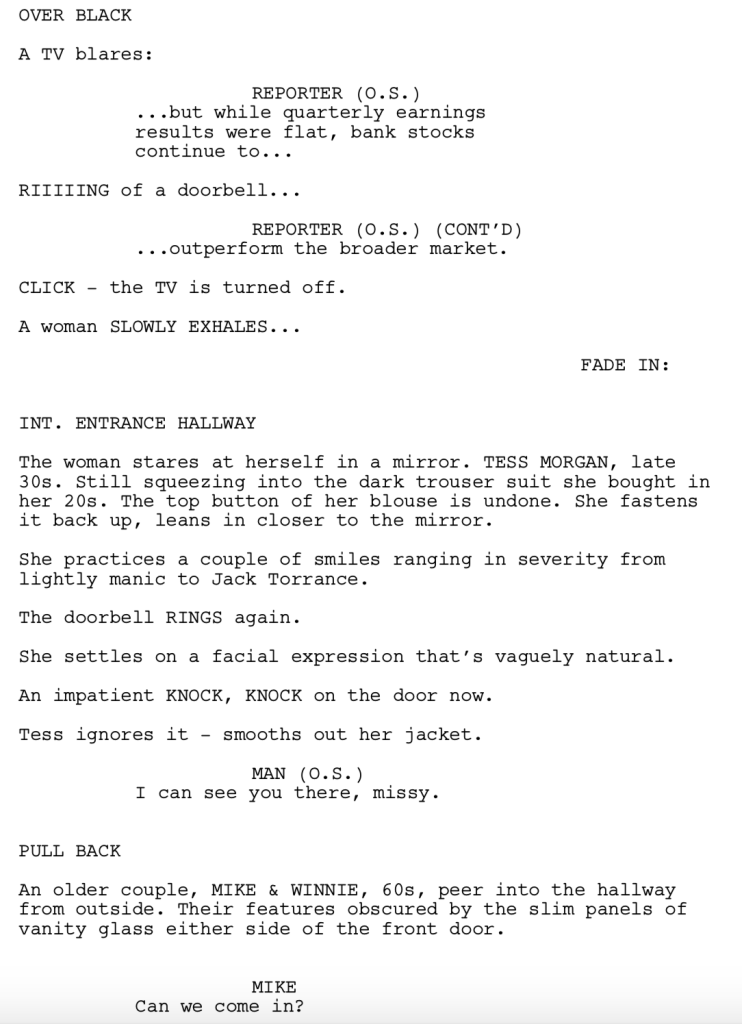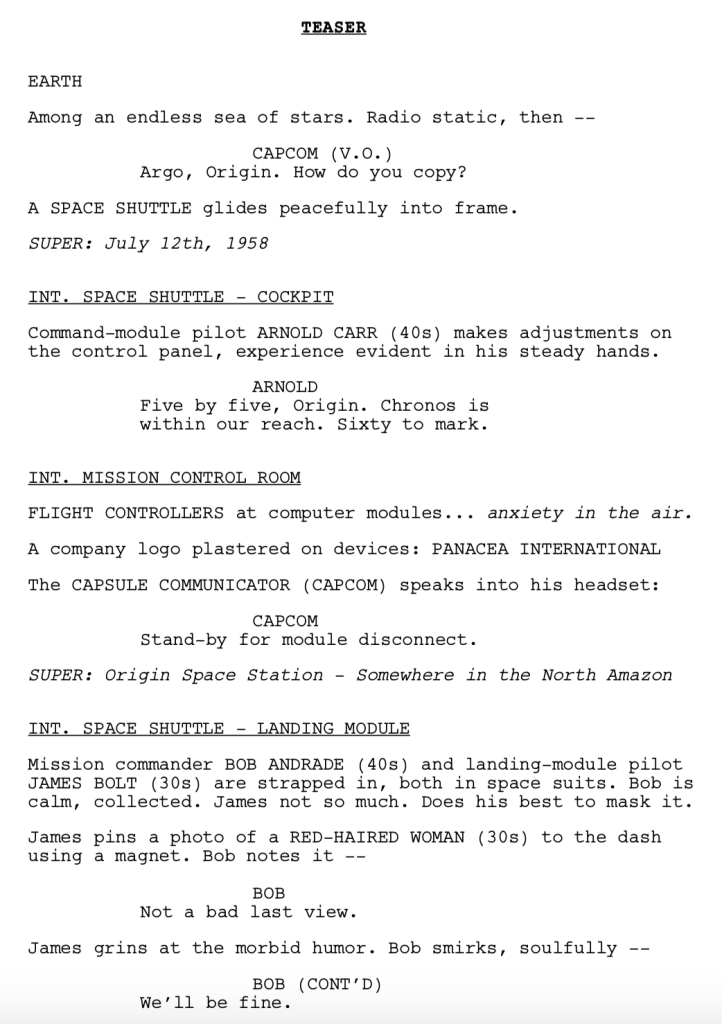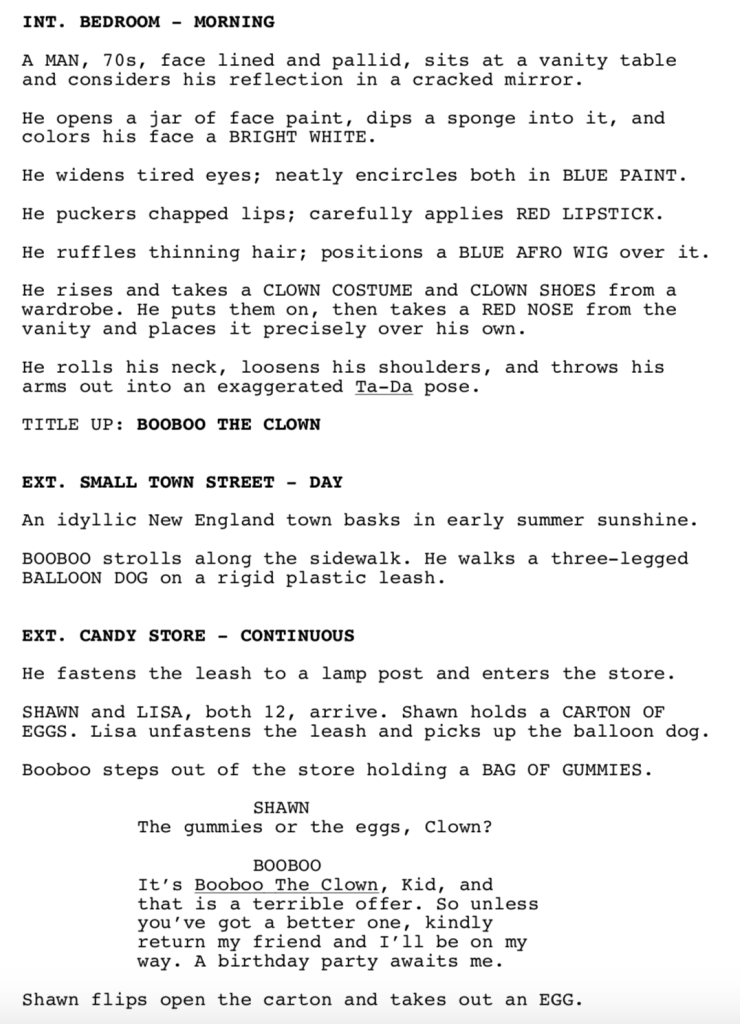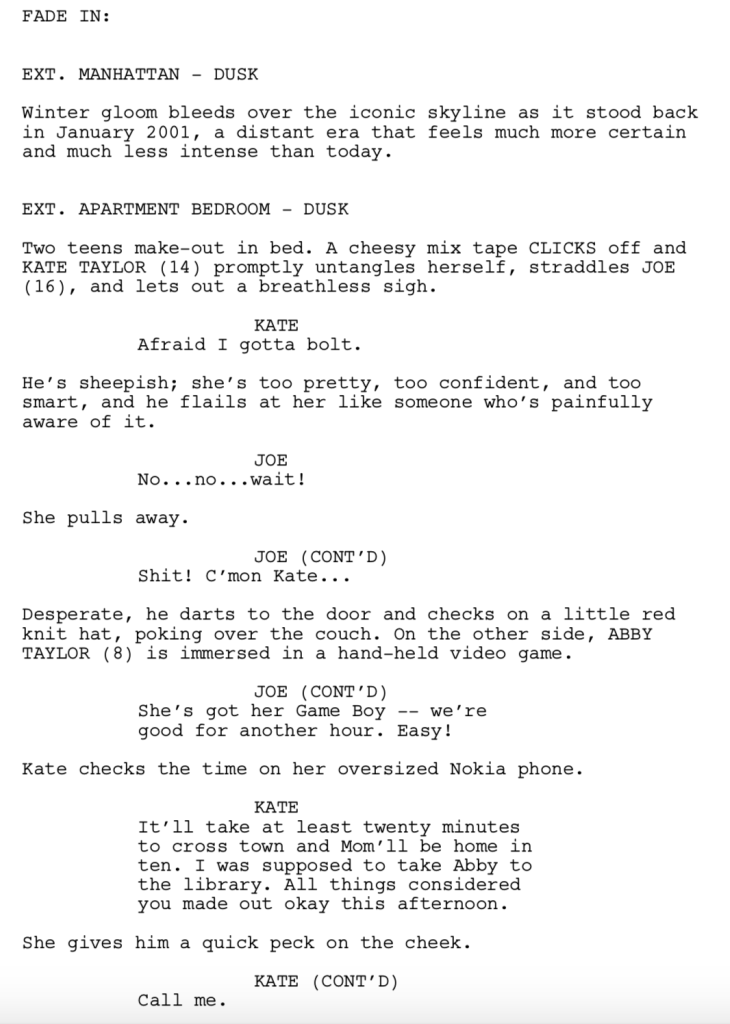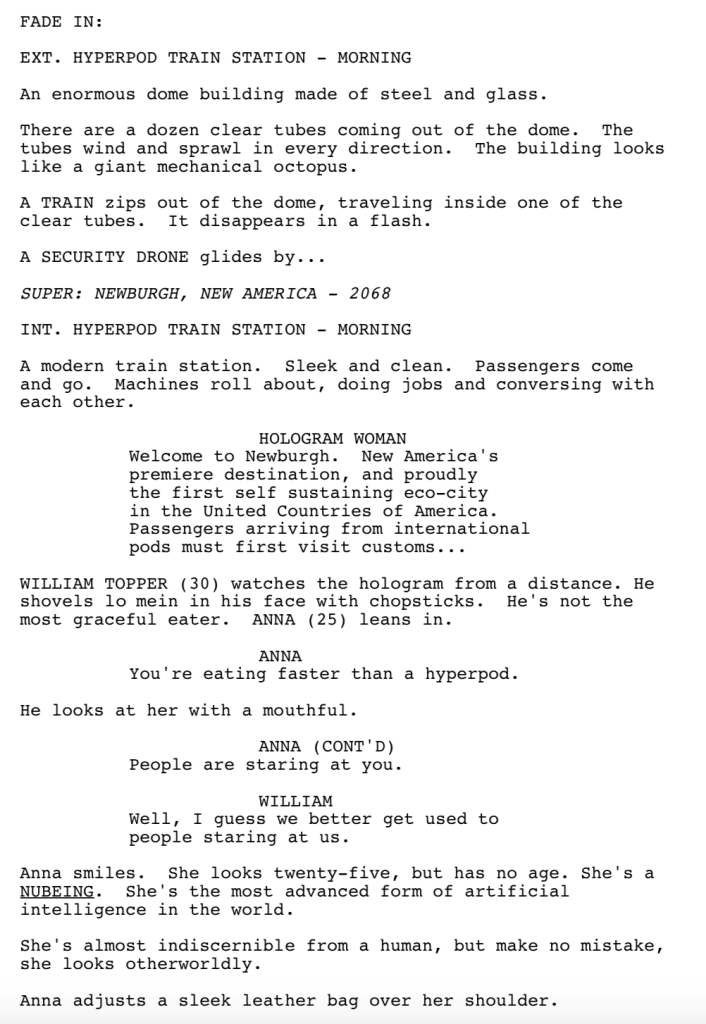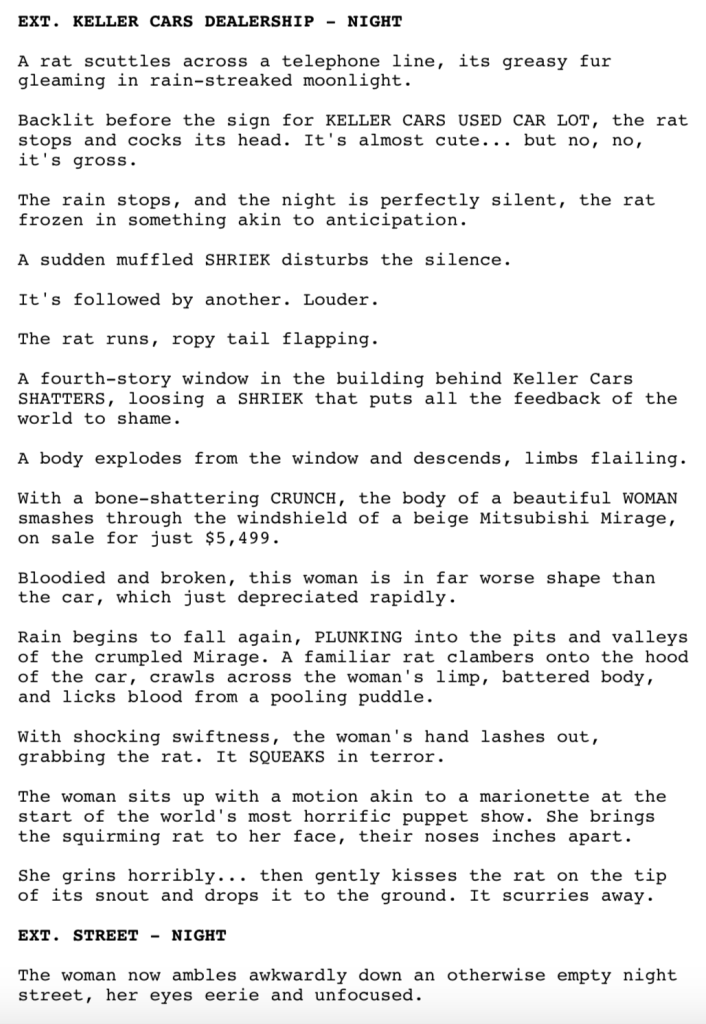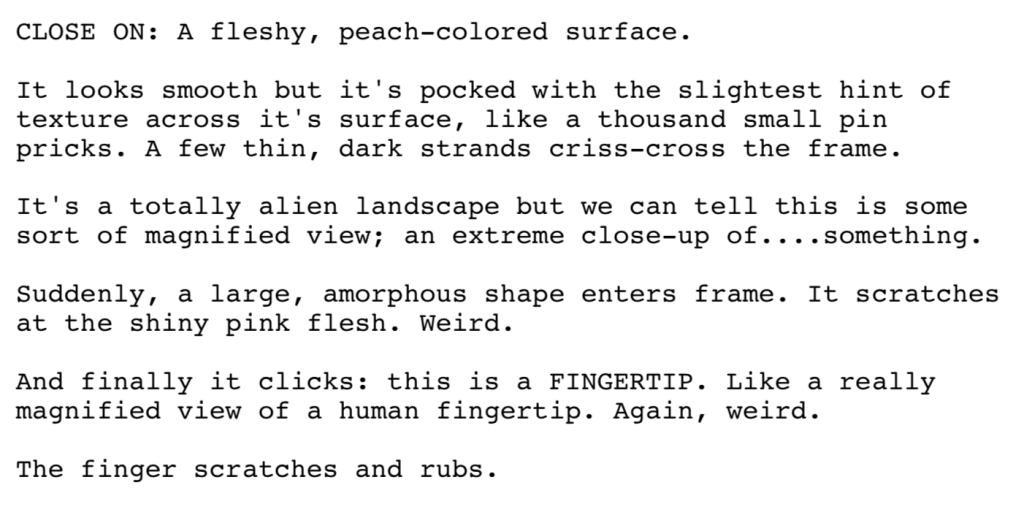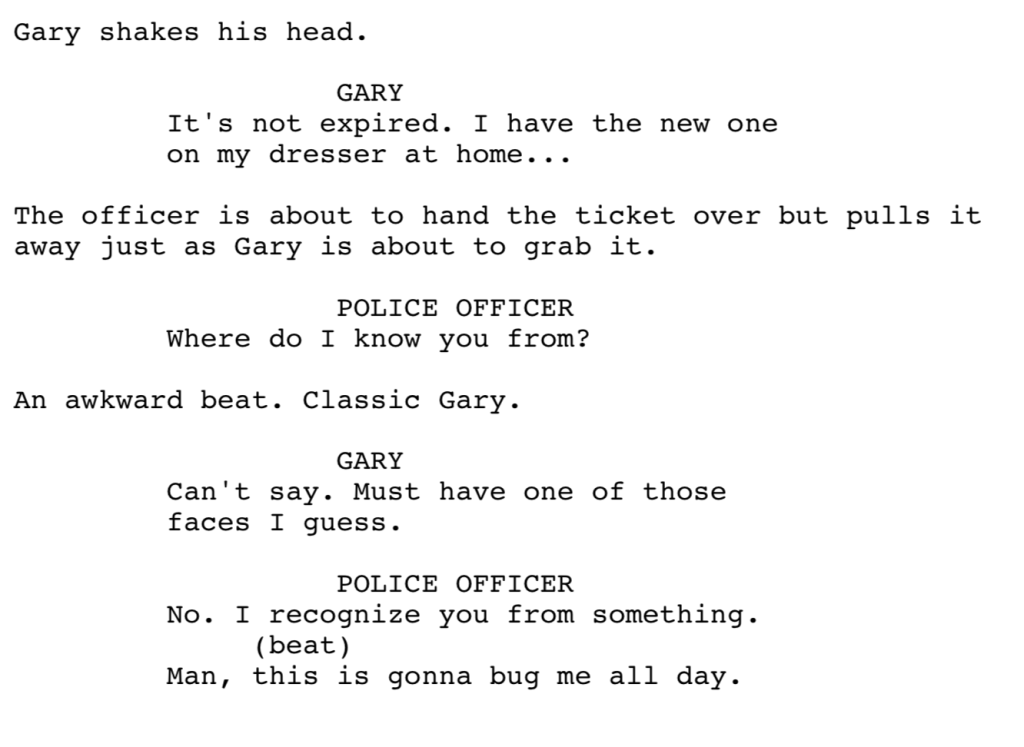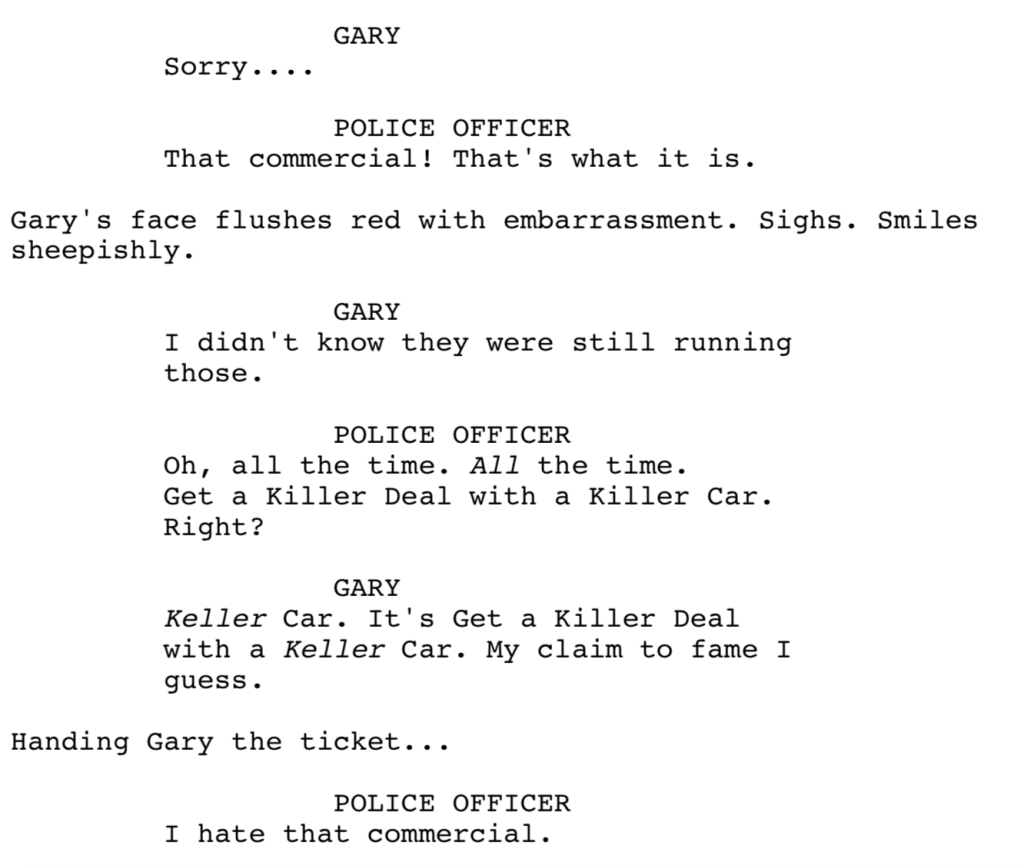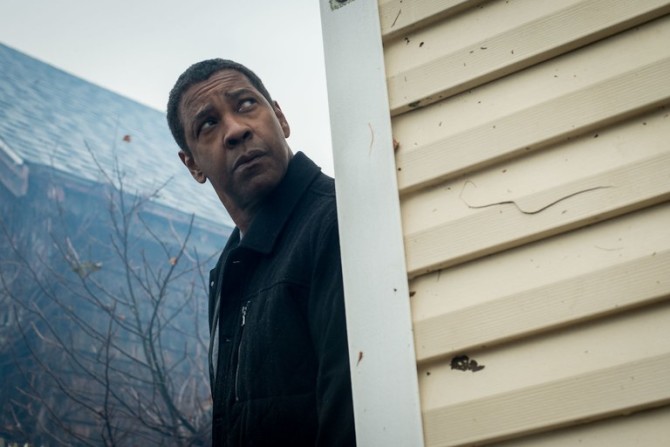Search Results for: F word
Genre: Thriller/Supernatural
Premise: In the premiere episode of CBS All Access’s Twilight Zone, a bad comedian is given the opportunity to become famous. But that fame comes with a price.
About: When Hollywood showed up at Jordan Peele’s door with a blank check, the first thing he said he wanted to do was revitalize The Twilight Zone. So he teamed up with Simon Kinberg to bring the famous show into the modern age. Kinberg sold the show this way: “We would do what Rod’s instinct and impulse was, which was to break barriers, to tell new kinds of stories, to create something that was so outrageous and noisy and dangerous that it wouldn’t fit into sort of the standard way of storytelling.” Those are bold words. Is that what we got?
Writer: Alex Rubens
Details: 1 hour long
What’d you think we’d be talking about today?
It’s Jordan Peele’s world. We’re all just living in it.
Can Hollywood’s new golden child keep his winning streak alive? Find out with me.
Samir is a terrible comic. He’s convinced that comics need to have “something important to say about the world” for their act to be relevant. His main routine is about the second amendment, a heady dive into what each word in the amendment means. Needless to say, he doesn’t get many laughs.
Then one day Samir is visited by legendary comic JC Wheeler. JC tells Samir that he can be a great comedian. But he has to stop talking about politics and start talking about his life. When his next set tanks, Samir decides to use JC’s advice and tells the crowd about his kooky dog named “Cat.” Out of nowhere, everyone starts laughing.
Except when Samir gets home that night, his dog is gone. In fact, his girlfriend tells him they’ve never had a dog. What’s going on? The next day Samir does a set about his 10 year old nephew who wants to be a comedian when he grows up. Afterwards, his nephew’s been erased from existence.
Samir finally catches on. Whatever he talks about ends up being erased. So Samir begins using this power for evil. For example, he sees old friends on Facebook who he doesn’t like and talks about them on stage so that they disappear. Unfortunately, his success starts going to his head, and soon he’s blowing off his girlfriend and playing ‘cool guy at the bar.’
When Samir is given a chance at landing a big show, he needs only to beat out Didi Scott, his best friend at the club. Of course, why beat her out when he can just talk about her on stage and make her disappear? Will Samir stoop to that level? Or does he still have some semblance of morality in him?
I won’t call The Comedian an outright disaster. But it’s close.
Something feels off about the episode from the opening scene. It was the tone. It’s supposed to be this weighty examination of a comedian desperate for fame. Yet none of the characters were selling it. That’s when it hit me. Every single one of these characters is being played by a comedy actor. Which you would think makes sense in a script about a comedian. But this was a drama. Not a comedy. And the actors didn’t have the emotional depth to nail those dramatic beats.
It was around this time that I checked out who wrote this. Alex Rubens. The writer of such dramatic and thrilling films as Community, Keanu, Rick and Morty, Key and Peele. Not only were we missing actors who could handle the dramatic beats, we were missing a writer who could handle them as well.
Something tells me this was a movie idea of Jordan’s. But unlike Us and Get Out, he hadn’t fleshed it out. So he sent it over to his buddy Alex to turn it into a one hour episode on Twilight Zone. Somewhere in that exchange, Jordan forgot to explain what the episode was actually about. It starts out with a sliver of a good idea – Would you be willing to lose the people you love in order to become famous? But somewhere along the way it becomes about a guy who uses his power to make people he doesn’t like disappear.
The longer the episode went on, the more frustrated I got. This was the pilot episode for the rebirth of one of the most iconic shows ever. And you dump this garbage heap up to our door?
It might have been a lost cause from the start. Serious movies about comedians never turn out well. I think there’s two decent ones in all of history. Sure, there’s something ironic about examining the serious side of comedy. But you also take the best thing about comedy – laughing – and eliminate it from the equation. So now we’re just watching depression. Yippee.
That was another thing. I couldn’t tell if Samir’s comedy bits were supposed to be funny or if the audience was only laughing because JC had put a spell on Samir’s routines to make people laugh regardless of what he said. If we’re unsure whether your comedy bits are intentionally unfunny or not, your flick’s got a lot of problems.
The episode FINALLY finds a good thread when Samir, who suspects his girlfriend’s mentor, David, is trying to fuck her, brings it up in his next routine. Afterwards, David doesn’t exist. Except now, his girlfriend is no longer a lawyer. She’s a waitress. Why? Because her mentor, David, was never there to help her. Okay, I thought, now we’re on to something.
But in the very next scene, Samir’s girlfriend gets in a fight with him for no discernible reason. Why is she mad at him, I asked. She was just dying laughing watching his set. Ohhh, because it was time for an “argument scene.” Classic bad screenwriter mistake. Your characters don’t have a reason to argue. But you need them to argue for your next plot point to make sense so let the arguing begin!
Jordan Peele is the coolest nicest guy in the world. I saw him on Bobby Lee’s (a fellow comedian) podcast earlier in the year. The two go way back. When Peele started to blow up, he gave Bobby Lee a huge job that basically paid his mortgage for a year. And he does that sort of thing for a lot of people. But if Peele starts prioritizing helping his friends over creating good entertainment, he’s not going to be the belle of the ball for long. You still have to hire people who are capable of doing the job. The guy who wrote this episode is not capable of doing the job. Nor were half the actors cast in this episode. I hope Peele learns that lesson.
[ ] What the hell did I just watch?
[x] wasn’t for me
[ ] worth the stream
[ ] impressive
[ ] genius
What I learned: Although they found a way to screw it up, The Comedian is a good example of how to add a “tax.” A “tax” is something you add to your hero’s choices. The hero can choose to gain something (fame). But there’s a tax to that gain (something he loves ceases to exist). You should be taxing your characters with every choice they make.
It’s a slow weekend at the cinema which means I’ll have to watch something Netflix snuck onto its service while no one was looking (their preferred method of advertising). Who wants to start a website with me called “Media Aggregator” where we distill the 8 million TV and movie options down to a select few you should be watching? We’ll make billions. BILLIONS I SAY!
In the meantime, here are some screenplays to read.
Amateur Showdown is a mini-screenplay tournament where you read as much of each script as you can, then vote for your favorite in the comments section. Whoever receives the most votes gets a review next Friday. If you’d like to submit your own script to compete in a future Amateur Showdown, send a PDF of your script to carsonreeves3@gmail.com with the title, genre, logline, and why you think your script should get a shot.
Title: Bank, Die, Repeat
Genre: Time Loop Heist
Logline: A washed-up realtor gets caught in a time loop when she tries to rob a bank. Forced to relive the heist again and again, she’s soon convinced that whatever’s in the safe is more valuable than money, it’s the key to turning her life around.
Why You Should Read: This script started life as a three word phrase – ‘time loop heist’. It ended as a dark comedy I’d pitch as ‘Jerry Lundegaard stuck inside Danny Ocean’s Groundhog Day.’ Only Jerry is now a woman named Tess. — I’ve bludgeoned the protagonist with the despondency stick. Her love life, her family life, her working life – she’s losing control of it all. If you’re interested in how (or indeed, if) she can pull it all back together again and find redemption, then give the script a go. I’d appreciate your candid thoughts.
Title: Second Earth
Genre: TV Pilot – Science Fiction
Logline: Searching for a sense of purpose, an anxiety-ridden Earth orphan arrives on the prison moon Chronos as a new guard recruit… only to stumble upon a conspiracy for the near one million prisoners to stage a mass breakout and take the moon for themselves.
Why You Should Read: In the 1920s, Henry Ford established an industrial town deep in the jungle of Northern Brazil, hoping to make his own utopia called “Fordlandia”. Now imagine instead of a small town in Brazil… he did so with the moon. The series takes place in an alternate timeline where our moon, named Chronos, is habitable and is colonized by a billionaire philanthropist in the 1960s. Our story begins in 2082 as we see the moon now sustained by serving as basically a privatized prison for the United States and the colonies of Chronos wrought with civil tension between the descendants of the first Chronos colonies (called Natives) and Earthling immigrants. We will discover the story of the failure of this would-be utopia as we are embroiled in a conspiracy plot with a scale and character count rivaling that of Game of Thrones. Think A Tale of Two Cities in space.
Title: BOOBOO THE CLOWN
Genre: Family/Fantasy/Adventure
Logline: An eccentric old clown tries to cheer up a disabled boy by telling the story of his magical adventures on a lifelong quest to win the heart of a beautiful mime.
Why You Should Read: A massive THANK YOU to the commenters of Scriptshadow who read my first draft of this script and offered their valued thoughts and notes on it, and a special shout-out to Carson for his excellent notes and advice. All helped to propel this script to the next level. Booboo The Clown is an original, entertaining, and visually-appealing family-friendly movie. This one has it all. It has a larger than life lead character – a classic underdog – and a novel supporting cast with genuine arcs that actors will queue up to play. It has adventure. It has adversity. It has smiles, laughs and tears. It has scenes you have never seen before. And, most importantly, it has a fucking heart. I have poured my heart into this script and now I’d love to read your thoughts. I send it out as words amidst the wolves. Be ravenous.
Title: Fear Box
Genre: Horror
Logline: A traumatized single mother must protect her anxiety-ridden teen daughter when their darkest fears are brought to life by a haunted worry box.
Why You Should Read: It’s 2019 and it feels like anxiety is at an all time high! The goal was to write a fun horror script that deals with anxiety in a genuine way. The worry box is a real tool used to treat childhood and teen anxiety. I sent an early draft to the Bloodlist site for coverage and the feedback was positive. I’m hoping for some constructive criticism and the answer to the ultimate question before I spend tons more time working on this – is this concept/story something you would go see?
Title: D.I.R.E.
Genre: Science Fiction / Drama
Logline: Guess Who’s Coming to Dinner set 50 years in the future. A young man takes his Artificial Intelligence fiancé back to his small mountain hometown to meet his techno-phobic family.
Why You Should Read: I’ve been reading and following Scriptshadow for the last 7/8 years. Needless to say I’m a big fan of the site and all of you guys. I’ve just been lurking in the shadows (evil laugh). I live in Los Angeles, and have been a working writer for the last decade or so… but primarily in late night TV. I haven’t been able to crack the ever elusive feature world yet. This script is my first feature where all of my feedback has been super positive. And not the fake “I’m your friend” positive… as a writer you know the difference. Anyway. I’m extremely serious about the craft, and have put a ton of work into this one. If you like SciFi dramatic mysteries… this is for you… if you hate robots then beep boop beep boop… it’s probably not your cup of ET.
I’m overworked and under the weather so I won’t be able to put up a review today but I didn’t want to leave you hanging so here’s a quick dialogue hack. This came up in a recent script consultation. The writer had written a good script but was having some issues with on-the-nose dialogue. On-the-nose dialogue is basically when a character says exactly what’s on their mind or exactly what needs to happen to move the plot forward. Now while I knew this was a problem, I was having trouble conveying how to fix it. Then it hit me.
“I” is a gateway word to on-the-nose dialogue.
Think about it. “I’ve always struggled connecting with people.” “I wish I would’ve listened to dad more.” “I can’t do this anymore.” These are very ON-THE-NOSE things to say. So here’s a solution. Instead, have the other character in the scene say these things. You get the exact same information across, but without the on-the-nose quality. “You’ve always struggled connecting with people.” “You should’ve listened to dad more.” “You can’t do this anymore.”
The reason the “I” stuff is problematic is because we rarely, as human beings, break down and release our deepest darkest thoughts about ourselves to others. Therefore it reads inauthentic. It can work if the entire movie has been building up to some cathartic breakdown. But otherwise, you want to avoid it. This is just ONE WAY to do so. But sometimes, eliminating the “I” lines altogether is the way to go.
Now go do some writing!
Congrats to Adam and his mysterious co-writer for winning the First 10 Pages Challenge with their script, “Personal Hell” (aka “Girl Who Disturbed The Rat”)!!! He wins a feature consultation from me! Yaaay!! For those of you who weren’t around in January, I set forth a challenge to write 10 pages that were impossible to put down. There were over a thousand entries. My one rule was, “As soon as I’m bored, I’m out.” The eleven finalists were announced last Thursday. And you, the readers of the site, voted for the winner. It was a close race but Rat took home the top prize. Adam e-mailed to let me know he and his writing partner are going to put this script together over the next few months. He pitched it as, “American Beauty meets Evil Dead.” Is there a better crossover pitch in history? He even sent me a synopsis.
Gary Klein is on the cusp of absolutely nothing. As an Assistant Manager of California’s 12th largest used car dealership, he has resigned himself to a life of complete and utter normalcy. He and his wife, Beth, were high school sweethearts and have been married for 20 years. She’s the only person that he’s ever slept with and Gary and Beth’s marriage now sits on a foundation of resentment and mistrust as result of an affair that Beth had last year. The two are in therapy and Gary remains committed to the relationship, despite his increasing obsession with the fact that she has now, “been with two and I’ve only been with one. It doesn’t seem fair!” In an effort to quell the issue, Beth offers Gary a ‘hall pass’: he is free to sleep with another woman, if he can seal the deal. Amazingly, Gary is able to seal the deal with a sexy and mysterious woman who picks him up at a bar, but she turns out to be a soul sucking Succubus straight from hell! Gary barely escapes with his life and only half of his soul. Now, he and his horror fanatic son, Zack, must quite literally descend into the depths of hell to reclaim the rest of Gary’s soul and, just maybe, a little bit of his pride.
You can read the first ten pages yourself here. In the meantime, I’m going to explain why these pages won me over and why I believe you voted them the number one entry. Let’s get started.
First lines are important. They not only begin your story, but they’re a major clue as to whether the writer can write or not. If the line is sloppy, it’s a bad sign. If it’s overwritten, it’s a bad sign. If it has grammar errors, it’s a really bad sign. A good first line is confident, but not overtly so.
A rat scuttles across a telephone line, its greasy fur gleaming in rain-streaked moonlight.
I like the verb “scuttles.” It’s a small thing. But it’s more descriptive than “runs.” However, the prize word in this sentence is “greasy.” Saying “rat” conjures up a generic image. And generic images are death in writing. Film is a visual medium so the challenge is to create the image the viewer will see onscreen. You can do that by choosing words that bring images to life. A “greasy rat” is so much more visual than a “rat.” This might sound like over-analysis, but I knew after this line I was in good hands.
…the rat stops and cocks its head. It’s almost cute… but no, no, it’s gross.
This is another good sign. The writer is having fun. He’s not trying to ace a grammar test. It’s “almost cute,” but “no, no, it’s gross.” With so many scripts, I can feel the consternation in the writing, like the writer’s terrified that if even one word isn’t perfect, he’ll be laughed out of screenwriting. This writer is relaxed and cool, and that makes me feel cool.
With a bone-shattering CRUNCH, the body of a beautiful WOMAN smashes through the windshield of a beige Mitsubishi Mirage, on sale for just $5,499.
This is the moment I knew I’d be reading all ten pages. A lesser writer would’ve started this scene on the woman. By starting on the rat, then having the woman explode out of nowhere, it displays a sense of surprise that indicates a creative mind. And the level of detail at the end of the line is genius. She doesn’t just fall into a “used car.” She smashes through the windshield of “a beige Mitsubishi Mirage, on sale for just $5,499.”
Bloodied and broken, this woman is in far worse shape than the car, which just depreciated rapidly.
Again, look at how much fun the writer is having. And not in that annoying “LOOK AT ME” way that lots of amateur writers resort to. What is “look at me” writing? Something like: “She just crashed into the kind of car you lost your virginity in at your senior prom.” The humor in this line is just bold enough to grab our attention, but no so bold that it kills the suspension of disbelief.
The woman sits up with a motion akin to a marionette at the start of the world’s most horrific puppet show. She brings the squirming rat to her face, their noses inches apart.
Wait a minute. The woman is still alive?? Okay now I just went from interested to involved. — As we move into page 2, with the woman getting hit by a truck, you begin to see why this script won the challenge. SOMETHING IS HAPPENING. But not just “anything” something. Something rare. A lot of you sent me scripts where things were happening, but they were common scenarios. Like robbing a bank or a car chase. Note how something is happening here, but it’s also unique. Who is this woman? Why is she falling into cars and getting hit by trucks and is still alive? Those kinds of questions are what’s keeping me reading.
This is why I’m not putting the script down. There’s a sophistication to the writing that nobody else brought to the table. Look at the unique way the writer chose to reveal something as simple as a finger scratching. Note the breezy confidence within the sentence structure itself. You read this sequence and you feel like you’re reading a writer who has command. Contrast that with the below clip from another entry. There’s nothing wrong with the clip. But note how stiff the presentation is compared to Personal Hell.
Moving on…
GARY KLEIN sits nude, in all his forty-five year old glory, on the edge of the formica counter top in his ‘master’ bathroom.
Look at how great this character introduction is. The character intros I usually read go something like this: “Gary (40s) looks much older than his age.” How much more awesome is meeting Gary nude, “in all his forty-five year old glory.” And doing so amongst such a specific visual image. Again, guys. Note the SPECIFICITY in the writing. He’s not sitting at a sink. He’s sitting “on the edge of the formica counter top in his ‘master’ bathroom.” That kind of writing is what creates an image in the reader’s head.
GARY: “Have you seen my dropper thing?”
A seemingly innocuous line of dialogue. But this line says everything about the level of talent on display here. Most writers would write this line literally. Instead we get this fun, but more importantly, REALISTIC, line of dialogue: “Have you seen my dropper thing?” That’s how people really speak, which adds to the authenticity of the script. — And that fun dialogue continues as he and his spaced out wife chat. Why wouldn’t I want to keep reading this script? I’m having a blast.
The introduction of Gary’s son Zach is fun. But it wasn’t that that I was impressed with. I love how the end of this scene pays off Gary’s earlier intro. He’s looking for his “dropper thing” and it turns out his weird son is using it for his weird experiment. Setups and payoffs display a level of planning that indicate the writer has actually thought through their script. This may seem like a small thing but half the screenplays I read, I can tell the writer is figuring things out as they go along.
He’s immediately broken from his trance and quickly turns the station to some alt. country bullshit.
I mean, come on. If I stop reading, I’m going to miss out on more lines like this. No chance. I have to keep going. Next up we have an exchange with a cop after Gary was rear-ended. I love how Gary was the one who was rear-ended but he’s still getting a ticket (for expired insurance).
This is a classic scene reversal at the end, a tool all of you should have in your toolbox. The scene is going in one direction: Wow, you’re that famous guy. It ends in the opposite direction. “I hate that commercial.”
And the pages end with another payoff. Gary shows up at his place of work, which happens to be Ground Zero for what happened in our opening scene. At the risk of repeating myself, this displays a writer with a plan. When you combine that with a unique opening scenario, writing sophistication, and a sense of humor, you get a script which conveys that elusive “voice” that Hollywood agents and producers are clamoring for. Did I have any issues with the pages? Not really. Maybe we could’ve given Zack a more interesting introduction. It didn’t make a whole lot of sense that he’s looking at himself in the mirror first thing in the morning practicing his pretend cutting. But it did give me a nice feel for the character. Adam was spectacular in that department. I got a good feel for everybody.
The question now becomes, can Adam and his writing partner turn this into a killer feature screenplay? I will keep you updated on that. He says he needs a few months to write the script. After I consult on it, I’ll ask him if I can review it on the site.
Congrats to Adam and his co-writer!
What did you guys think??
Today I teach you how to avoid the thing that did me in as a screenwriter.
Genre: Crime/Murder
Premise: A jaded detective teams up with a young cocky LA county detective to solve a string of murders in Los Angeles.
About: This project just got announced the other day. John Lee Hancock has convinced Denzel Washington to sign on to his long gestating project, which he originally wrote in 1997, back when these murder detective stories were all the rage (“Seven” came out in 1995). Can the duo revitalize the sub-genre?
Writer: John Lee Hancock
Details: 145 pages!!! (1997 draft)
This week is “Hollywood Reality Week,” as it’s a reminder of just how long it takes to get movies made. Monday, we had a big budget movie that took 10 years to see the light of day and needed the help of distributor who wasn’t even around when the script was written. Yesterday, we saw how a small budget project took 10 years and an industry about-face regarding equal opportunity to get made. And for today, you have to add both those projects together to equal the number of years it’s taken for The Little Things to land a green light. Maybe the most under-appreciated quality in a writer isn’t talent, or voice, or skill. But patience. Which is ironic, because you’re gonna need a lot of patience to get through this script.
Joe Deacon, or “Deke,” as he’s known to friends, is a veteran LA cop who’s been assigned to solve a recent string of murders. He’s paired up with the active detective on the case, Baxter, a movie-star looks hotshot who doesn’t like the fact that he’s been assigned a professional looker-over-shoulderer.
Of the four girls who have been murdered, there are a few similarities. The girls all have bite marks on their faces. And, strangely, while all the food in their apartment has long since rotted, there are a few items – like milk – that are fresh. How could that be? Or maybe the bigger question should be, why would any writer think that was interesting?
Things heat up when a fifth woman, Ronda Rathman, disappears, forcing Deke to go rogue, following his gut on a scumbag named Sparma. He starts following Sparma around town, waiting for him to slip up, but it turns out Sparma is a crime nerd, and makes Deke easily. He even volunteers to come in and answer any questions the cops have, cockily pointing out there’s no way he can be the murderer.
This bravado throws Deke, who thought he could take this case to the bank. He must re-collaborate with Baxter, who’s increasingly annoyed by Deke’s low-key investigation methods (Deke’s convinced that every murder is about the little things, never the big ones). But the two are going to have to learn to work together to stop this guy because, otherwise, more women are going to get bitten. And then murdered.
Today I want to tackle a screenwriting question I think about all the time. Because, if I’m being honest, it’s the reason I believe I failed as a screenwriter myself. And that’s this practice of vanilla screenwriting. John Lee Hancock is one of, if not the most, vanilla working screenwriter in the business. The Blind Side doesn’t have a single risky beat in it. The Founder is almost painful in its plainness. He even took a great screenplay in Saving Mr. Banks and watered it down so much, that what was once prime rib, became a Happy Meal.
What is “vanilla screenwriting?” How do you avoid it? Should you even avoid it?
Vanilla screenwriting is a combination of cliches, safe choices, familiar plot beats, and characters without extremes. The vanilla screenwriter knows what works. So his scripts are never bad. But the vanilla screenwriter can never rise above average. Vanilla screenwriting is the equivalent of the “nice guy.” The nice guy is always going to listen to your problems. He’s going to cheer you up with a dad joke. He’s going to be there if your car breaks down on the side of the road. But the nice guy never excites you.
That slot is reserved for the dangerous guy. The dangerous guy is not going to listen to you. He’s going to cancel your coffee date at the last second without explaining why. He prefers offensive jokes over dad jokes. And he doesn’t care if you think they’re funny or not. In fact, he seems only mildly interested in your reaction to anything he does. You should hate this guy. And yet all you can do is think about him.
Maybe the best way to explain vanilla screenwriting is to compare this script to the movie it was inspired by, Seven, a film that had come out 2 years before Hancock wrote The Little Things. “Seven” has victims who have been forced to eat until their insides exploded. “The Little Things” has victims with bite marks on their faces. Which of these two choices is vanilla?
So why are there people like John Hancock who have careers? Or Ron Howard? Or Roberto Orci and Alex Kurtzman? The answer is simple. It’s because some people like vanilla. What a lot of industry folks forget is that the average person only goes to the movies a few times a year. So they don’t need big sexy plots. A less assuming – yet still well told – story will do the job.
But the problem with vanilla screenwriting is that it’s an impossible style to break in with. I don’t know how John Lee Hancock got into this business. But I would bet my left hand that if he were an unknown screenwriter trying to break in today he wouldn’t be able to. His scripts are soooooooo bland. Soooooo middle-of-the-road. You forget them almost seconds after you read them. You have no idea how hard writing that plot summary was. Even fifteen minutes after finishing the script, I was trying to remember what happened.
I mean you can see it in two of the most important elements of the screenplay – the title and the main character. The title is “The Little Things.” It’s actually telling you that it’s going to be a “little” story with “little” going on. And the main character’s name, “Joe Deacon,” sounds like an amalgam of every single protagonist name ever. I don’t know how you get more vanilla than that.
Unfortunately, all of this plays out in the script. The investigation in The Little Things is so standard I will guarantee that nobody who reads it will be able to locate a plot element or a character they haven’t seen in a prime time network procedural. It’s that dull. The one thing you have to do when writing in familiar waters is bring something new to the table. There’s nothing new here, guys. Not even a single line of dialogue I haven’t read before.
So why did Denzel sign onto this? I don’t know. It probably has something to do with the fact that once a director gets an actor an Oscar (Sandra Bullock won for The Blind Side), he’ll always be able to get movies made because actors will think he can do the same for them. That’s the only reason that makes sense to me because otherwise, I don’t see a single original component to this script. It’s so vanilla, you’re afraid it’s going to melt. Actually, “afraid” is the wrong word. Cause if it had melted, I wouldn’t have had to read it.
[ ] What the hell did I just read?
[x] wasn’t for me
[ ] worth the read
[ ] impressive
[ ] genius
What I learned: To avoid vanilla writing, get messy. I wasn’t the biggest fan of True Detective, but the last thing that script was was vanilla. It had a brutal imaginative first murder scene. It jumped around in time. And it had a main character who was a f%$#ing mess. That’s how you stay away from vanilla.




